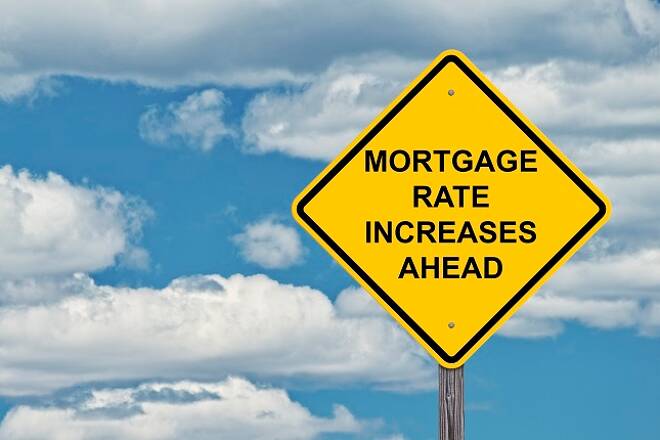Advertisement
Advertisement
U.S Mortgages – Up for a 2nd Consecutive Week
By:
Mortgage rates were on the rise again for the week ending 6th September, with wage growth and NFP numbers pointing to more in the week ahead.
Mortgage rates were on the rise in the week ending 6th September, a second consecutive week of gains coming off the back of 3 consecutive weeks of decline.
Economic data released though the week to Thursday provided support to the upward move in mortgage rates, with better than expected ISM manufacturing and non-manufacturing PMI numbers for August and some hawkish FOMC member commentary driving U.S Treasury yields higher through the week.
In spite of the positive sentiment towards the economy and a pickup in wage growth, according to official labour market figures released on Friday, affordability continues to be cited as an issue for prospective home buyers and the outlook for the real estate sector. Rising inflation, house prices and mortgage rates have ultimately led to the decline in housing sales, though a lack of inventory is also a factor.
The rise in yields and mortgage rates came in spite of continued concerns over the ongoing trade war between the U.S and China that saw the global equity markets see red through the week.
Freddie Mac weekly average rates for new mortgages as of 6th September were quoted to be:
- 30-year fixed rate loan increased from 4.52% to 4.54% in the week, while up from 3.78% a year ago. The average fee remained unchanged at 0.5 points.
- 15-year fixed rates rose from 3.97% to 3.99% in the week, while up from 3.08% from a year ago. The average fee fell from 0.5 points to 0.4 points.
- 5-year fixed rates increased from 3.85% to 3.93% in the week, while up from last year’s 3.15%. The average remained unchanged at 0.3 points.
Mortgage Bankers’ Association Rates for the week ending 31st August were quoted to be:
- Average interest rates for 30-year fixed, backed by the FHA, increased from 4.77% to 4.79%, with points decreasing from 0.75 to 0.69 (incl. origination fee) for 80% LTV loans.
- Average interest rates for 30-year fixed with conforming loan balances increased from 4.78% to 4.80%, with points easing from 0.42 to 0.43 (incl. origination fee) for 80% LTV loans..
- Average 30-year rates for jumbo loan balances decreased from 4.68% to 4.67%, with points holding steady at 0.30 (incl. origination fee) for 80% LTV loans.
Weekly figures released by the Mortgage bankers Association showed that the Market Composite Index, which is a measure of mortgage loan application volume, fell by 0.1%, following on from the previous week’s 1.7% decline, week-on-week.
The Refinance Index decreased by 1% in the week ending 31st August, following the previous week’s 3% slide, with the share of refinance mortgages rising from 38.7% to 38.9%.
The Mortgage Bankers Association also released its quarterly delinquency report for the 2nd quarter mid-week, with only 0.03% of the balance of commercial and multifamily mortgages held by life insurance companies being delinquent. Delinquency rates for the balance of multifamily mortgages held by Freddie Mac were also particularly low at 0.01%.
For loans held on bank balance sheets, the delinquency rate was the lowest in the series history, supported by rising property prices and a stable real estate environment, together with historically low interest rates, rising wages and a stable labour market.
Based on the unpaid principal balance (UPB) of loans, delinquency rates for five of the largest investor groups that account for more than 80% of commercial / multifamily mortgage debt outstanding were as follows:
- Banks and thrifts (90 or more days delinquent or in non-accrual): 0.5%, down by 0.01 from the 1st
- Life company portfolios (60 or more days delinquent): 0.03%, an increase of 0.01 percentage points from the 1st
- Fannie Mae (60 or more days delinquent): 0.10%, a decrease of 0.03 percentage points from the 1st
- Freddie Mac (60 or more days delinquent): 0.01%, a decrease of 0.01 from the 1st
- CMBS (30 or more days delinquent or in REO): 3.52%, a decrease of 0.41 percentage points from the 1st
For the week ahead, it’s another busy week on the data front, with key stats out of the U.S including August wholesale and consumer inflation figures, along with the weekly jobless claims and July JOLTs job openings. Following last week’s labour market figures, any pickup in wholesale or consumer price inflation would provide further upside for U.S Treasury yields that could see mortgage rates rise for a 3rd consecutive week.
While forecasts for the stats in the week ahead are expected to be Dollar and yield positive, it’s not just the numbers that the markets will need to focus on, with demand for U.S Treasuries continuing to pin back Treasury yields and mortgage rates from more material gains, though even Trump’s threat of tariffs on an additional $267bn worth of Chinese goods, on top of the planned rollout of tariffs on the $200bn, was unable to offset the effects of a jump in wage growth and better than expected nonfarm payrolls on Friday.
About the Author
Bob Masonauthor
With over 28 years of experience in the financial industry, Bob has worked with various global rating agencies and multinational banks. Currently he is covering currencies, commodities, alternative asset classes and global equities, focusing mostly on European and Asian markets.
Advertisement
